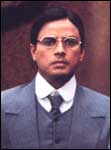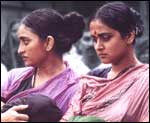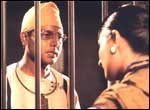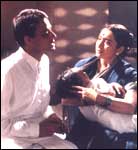A portrait of a patriot
Anjum N
- Did Vinayak Damodar Savarkar have a hand in Mahatma Gandhi's assassination?
- If not, why was he chargesheeted along with Nathuram Godse and the others?
- Did he play an active role in instigating/encouraging the Hindu-Muslim riots that hit India and Pakistan post-Partition?

Don't expect writer-director Ved Rahi's Veer Savarkar to answer these and other such questions. The film conveniently, one might say, ends with India's Independence, leaving these uncomfortable questions out of the script.
Presented by the Savarkar Darshan Pratishthan and financed 'by the people' (as the publicity brochures say) Veer Savarkar has been in the making for long. The end product, thankfully, does not show much time lag.
The film starts with Savarkar (Shailendra Gaur) moving to England to become a barrister and, in the process of earning his degree, to create unrest against the British Empire on its home soil. He is encouraged by his family (his wife, elder brother Ganesh and his wife), Madam Cama and Bal Gangadhar Tilak, among others.
In London, he enlists support for his revolutionary activities and begins translating into Marathi the biography of Giuseppe Mazzini, the Italian revolutionary who inspires him deeply.
 He also befriends Madanlal Dhingra (Pankaj Berry) and a few others who begin to share his vision.
He also befriends Madanlal Dhingra (Pankaj Berry) and a few others who begin to share his vision.
However, Sir William Curzon Wyllie is aware of Savarkar's anti-British writings in India and keeps tracks of his activities from day one. Savarkar's books The History of 1857 War of Independence and Mazzini are soon banned by the British.
Dhingra shoots Sir Wyllie at the India House and is arrested. Savarkar supports Dhingra's action openly. Soon, Savarkar is arrested and his case is transferred to India. On his trip to India, Savarkar tries to escape by jumping into the sea and swimming to south coast of France. He is re-arrested and brought to India and is sentenced to 50 years' imprisonment at the Andaman jail.
Here, he is confined to a solitary prison room for the first six months and made to extract 30 pounds of coconut oil each day later. When he speaks against the prevailing inhuman conditions in the jail, he is sentenced to seven days of standing handcuffs. Refusal to work till a prison mate is given medical treatment invites 10 days of crossbar fetters. He soon undertakes a hunger strike to protest against harsh treatment being meted out to a young inmate.
Savarkar is conditionally transferred to the Ratnagiri jail after 16 years -- he has to accept house arrest and not participate in any political activity. Eleven years later, his remaining sentence is written off.
 The film very touchingly brings to life the inhuman, cruel punishments meted out to political prisoners in the Andaman jails and the brave resisitance put up by the freedom fighters.
The film very touchingly brings to life the inhuman, cruel punishments meted out to political prisoners in the Andaman jails and the brave resisitance put up by the freedom fighters.
It succeeds in establishing the fact that the freedom movement had many more heroes than what we usually get to read or hear about. And presents us with one such character in Savarkar.
The film fails to convince the viewer why Savarkar suddenly changes from a revolutionary willing to sacrifice his life for the nation (till way past the interval), to one talking of a Hindu Rashtra opposed to Muslims (towards the film's end).
A short scene depicts three Muslim freedom fighters being brought to jail as part of the Khilafat movement. Here, they tell Savarkar openly that they oppose the British because it has invaded Islamic Turkey. The viewer is expected to believe that all Muslims who lay down their lives during the Independence struggle did so for the same reasons -- for Turkey and Islam, not for India!
Similarly, the scene showing Savarkar's meeting with Mahatma Gandhi, the latter is shown as unwilling to enter into a detailed debate over non-violence with Savarkar. Here, the actor playing Gandhi avoids Savarkar's forceful gaze, sits uncomfortably and leaves in a relieved hush with no real attempt to justify his views. Imagine a person so scared of expressing his views being able to lead a national struggle against the mighty British!
 Ditto the scene where Savarkar meets Subhash Chandra Bose.
Ditto the scene where Savarkar meets Subhash Chandra Bose.
Instead of bluntly showing Savarkar as a pro-Hindu, pro-Hindu Rashtra visionary, it attempts to hide his views and militant anti-Muslim role. And these very attempts fail the film.
Shailendra Gaur has given the title role his all. He portrays pain, suffering and revolutionary zeal with conviction.
Navni Parihar as his wife has pretty little to do. Ditto Mrinal Kulkarni as his brother's wife. Tom Alter as the cruel jailor at the Andaman jails is good. Bob Christo as Sir Willie has nothing new to offer, except his usual grimaces and Anglicized accent. Pankaj Berry overacts.
The film has only one song sung by musician Sudhir Phadke himself.
Overall, the film will find favour only among Savarkar's followers. It will surely be used by Sangh Parivar outfits to showcase their very own freedom fighter and propagate his unfinished dream of a Hindu Rashtra.